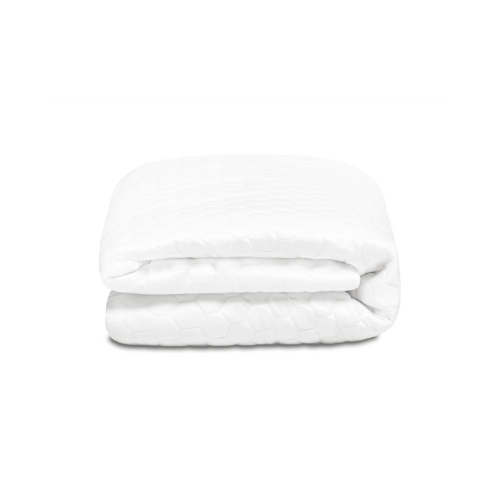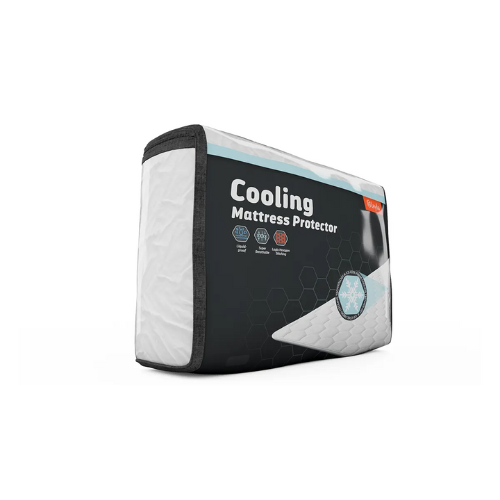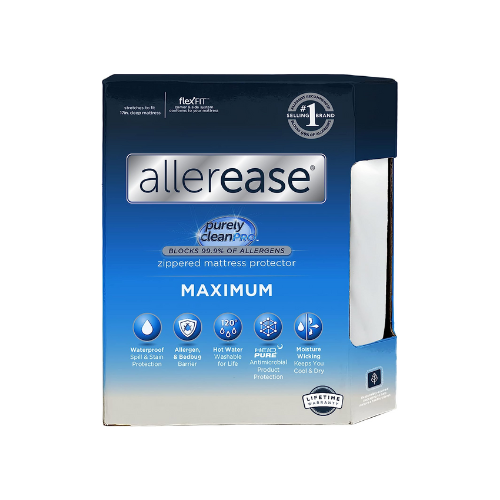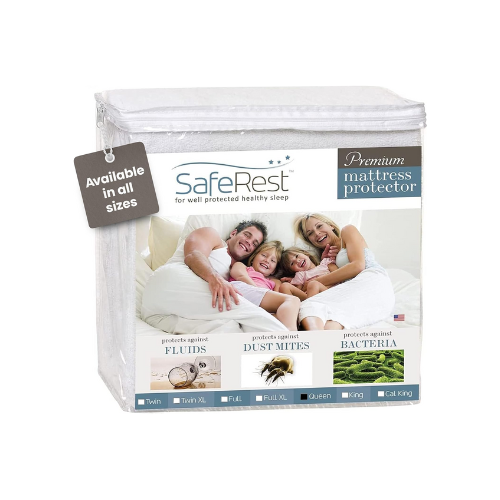The Best Mattress Protectors, According to Sleep Experts

Our editors independently select the products we recommend. We may earn a commission on items bought through our links.
The mattress is simultaneously, arguably, the home’s most important item for health and the most rife for damage. Wear, tear, spills, sweat, stains, and bugs all pose a threat to what’s supposed to be a place for peaceful rest. Quick napkin math makes obvious that humans spend around one-third of their lives asleep and despite the pedestal the mattress finds itself on, few sleepers think much about what goes into caring for their mattresses or how to protect their steep investments.
Today's Top Deals
A mattress protector can add years to the life of any mattress, even if most of the life being lived on top of it is a sedentary one. It reduces general wear and tear and can defend the mattress from active damage, like the dreaded bed bug or that one roommate who can’t keep a drink steady for his life. Some mattress protectors, polyester usually, also include cooling features for anyone who runs hot at night or sleeps next to someone who does.
Where there’s a bed in need of protection, there’s a heroic mattress protector ready to save it. Its valiant efforts don’t have to break the bank either. Solid queen-size protectors go for around $30, with higher quality options at $80 to $120. The max price, after which there are diminishing returns, is about $200. But any of those price points are a bargain compared to the cost of a new mattress.
SPY Tapped Experts
SPY spoke with six sleep and mattress experts and two pest control pros to better understand mattress protectors, including Dr. Michael Breus, chief sleep officer at Sleep Doctor; Parima Ijaz, founder and CEO of luxury bedding brand Pure Parima; Byron Golub, VP of product & merchandising for luxury sleep company Saatva; sleep science coaches Carlie Gasia of Sleepopolis and Julia Forbes of Sleep Advisor; Jordan Diatlo, the founder and creative director of industrial design company Leadoff Studio; Michael Colongione, the director of operations at GotchA! Bed Bug Inspectors; and Christian Tweed, a renewal specialist at Clark’s Termite & Pest Control.
The most burning question: Do mattress protectors actually work? Yes, mattress protectors can prevent spills and bed bugs, though not always to a perfect degree.
What the Experts Say: Bed Bugs
Breus is succinct here: “As a general rule, I always tell people to get a mattress protector, just to protect your investment. They keep the surface clean, waterproof the mattress, reduce allergies, and limit bed bug exposure. Some even have cooling properties, which may be helpful.”
Now what about bed bugs? Tweed says zippered full-encasement mattress protectors can simplify dealing with them, but he offers a critical caveat. “It’s important to understand that they won’t necessarily prevent you from getting bed bugs (since bed bugs hitchhike, mattress protection can’t stop them from being carried into your home).” Colongione echoes Tweed, saying, “Encasements won’t rid your home of an infestation or prevent you from having bed bugs, but they will surely save you from having to purchase a new mattress.”
Both advise buyers concerned about bed bugs to seek out white, zipper-enclosed encasements for full mattress coverage and easy bed bug detection and disposal. For best bed bug-free results, they also recommend encasing box springs alongside the mattress and avoiding pure plastic encasements because they can rip.
What the Experts Say: General Mattress Protection
Beyond bed bugs, the expert advice is more straightforward. Protectors come in all the same sizes as mattresses, with prices typically going up in size. Polyester and cotton are commonly used because they’re generally quiet, comfortable, breathable, and machine washable, Gasia says. Golub notes that polyester is durable but can often lead to a warmer sleep surface. Polyurethane, typically TPU or thermoplastic polyurethane, is generally the waterproof interior lining and is paired with polyester because the two bond well together.
Diatlo explains, “Cotton can breathe and it is 100% natural, so it’s renewable, extremely comfortable [and] works well in the summer when you need ventilation. Synthetic materials like polyester and polyurethane are better for the protection part, and are often used to bring the price down.”
Before buying, experts also mention two challenges to consider: Waterproof protectors can sometimes be difficult to wash, especially vinyl ones, and they can be difficult for some people to put on and take off.
Ultimately, Golub advises buyers to evaluate their needs and purchase accordingly. “It is important to consider what the sleeper is protecting against, whether it is liquids vs. dust vs. general wear and tear,” he says. “They should consider what the barrier/protection source is, and choose a style that won’t harm the sleeper or lead to an uncomfortable night’s sleep.”
And for anyone concerned about making the wrong pick, many mattress protectors, like mattresses, come with trial periods for peace of mind.

BEST OVERALL
Brooklyn Bedding Luxury Cooling Mattress Protector
Buy Now
The Brooklyn Bedding Luxury Cooling Mattress Protector offers water resistance and reasonable bed bug and dust mite protection without compromising on temperature or sound, which is pretty much the entire goal here.
Breus says, “For an overall great product, Brooklyn Bedding is really good and feels luxurious. My partner seems to hear every little noise or sheet crinkle, so I really appreciate this one because it is so quiet.”
Though this protector is made from TPU and polyester, Brooklyn Bedding defies the trend of polyester holding heat with its TitanCool proprietary treatment, which uses phase-changing molecules to control heat.
It’s on the pricier side for a queen fit at just under $97, but this mattress protector runs 14 inches deep to ensure adequate protection on the top and sides of the mattress.
So unless price or bed bug protection is the top priority, this mattress protector checks all the right boxes to encourage a cleaner, deeper sleep and maintain the mattress.

BED BUGS PROTECTION
Layla Full Encasement Mattress Protector
Buy Now
A caveat for anyone who skipped the experts: No mattress protector can stop bed bugs from entering the home. Its role is to prevent them, improve visual detection, and make removal easier by discarding the bed bug-laden protector, which ultimately saves the mattress, Colongione says.
Now, for the best mattress protector before bed bugs arrive, the Layla Full Encasement Mattress Protector has the essential feature, zipper enclosures, which experts say is a must-have for any hope against bed bugs.
“Mattress protectors, especially encasement-style ones, help prevent bed bugs due to their coverage of the entire mattress,” Gasia says. “The zipper feature in these protectors ensures they are tightly sealed.”
Breus recommends the Layla too, saying, “For kids or situations where there may be fluid or bugs in the bed I like the Layla full encasement — with liquid or bugs, you really want the entire product covered with waterproof zippers!”

BUDGET PROTECTOR
Maximum Mattress Protector by Allerease
Buy Now On Amazon
Buy at target
For sleepers who want a cheap, reliable, polyester mattress protector, the Allerease Maximum Zippered Mattress Protector offers full zippered mattress protection, protecting from allergies, bugs, spills, and everything in between. Ijaz says, “This protector works as an encasement, which… can be helpful if you aim to prevent the mattress from getting damaged at all.”
Diatlo adds, “I get bad springtime allergies and it is tough to block microscopic pollen and allergens from invading your entire life. The fact that this blocks allergens and is machine washable is making me consider buying one.”
This protector can accommodate mattresses as deep as 17 inches and rocks a fair just-under $40 price for a queen fit.

MOST POPULAR
SafeRest 100% Waterproof Queen Size Mattress Protector
Buy Now On Amazon
The SafeRest Premium Mattress Protector stands out because it comes in two varieties, polyester and cotton. It’s also among the most popular and highest-rated mattress protectors on Amazon, with over 278,000 ratings. Cotton rules for many reasons, but it’s more comfortable and what people are already used to sleeping on.
Ijaz prefers cotton protectors to polyester options. “This protector allows you to choose between cotton and polyester, but it’s always best to go with the cotton option. This will ensure a more breathable and comfortable sleep,” she says. “Cotton is also very easy to clean and can be tossed in the washer and dryer on gentle cycles for a deep clean that doesn’t damage any of the fibers.”
Whichever option suits you better, this protector is straight-up cheap and a great value. It runs around $32 for a queen fit while still offering other key features, such as a waterproof layer, machine washability, and a tight, elastic fit.
That’s perfect for every bed in every kind of place, whether that’s bunk beds for kids, guest room mattresses or the inevitably nasty college dorm bed.
Frequently Asked Questions About Mattress Protectors
What are mattress protectors? Why should I consider buying a mattress protector?
Mattress protectors are exactly what they sound like: fitted sheets or all-encompassing encasements that add a barrier between the sleeper and the mattress. At their most basic, mattress protectors prevent stuff from contacting the mattress, which can be useful for spills, bugs, sleep sweaters, and more.
Golub explains, “Although mattress protectors come in varying shapes, sizes, and materials, they are all designed to protect your mattress from foreign elements, including dirt, debris, dust, spills, and accidents.”
More succinctly, Gasia says, “[The mattress protector’s] main job is to keep your mattress clean… and keep [it] in good condition.” She and Golub agree that using one and cleaning it is much easier than cleaning a mattress.
Diatlo adds that mattress protectors are also useful to maintain resale value or make swaps easier for short-term renters or those with frequent houseguests.
Do mattress protectors help with bed bugs? What’s the best mattress protector for bed bugs?
Yes, mattress protectors can help prevent bed bugs from getting into the mattress as well as other critters like dust mites. They instead make their home on the protector, which can be removed for washing or disposing. Disposal is best for bed bugs but dust mites can be killed in a washing machine with hot water.
The best mattress protectors for bed bugs are zipper-enclosed mattress encasements. Because the zippers seal 100% of the mattress so bed bugs have no entrance, as opposed to fitted protectors that leave the underside exposed.
“Encasements are another tool in your proactive toolbox. They help with keeping your mattress and box spring clean of stains,” Colongione says. “More importantly, they are typically stark white and allow for early detection of carpet beetles and bed bug evidence. Without them, mattresses and box springs provide a lot of cracks and crevices where bed bugs can deposit their eggs, larvae, and harborage for themselves.”
Tweed adds, “The encasement blocks direct contact to your mattress, preventing the bugs from making that their home.”
Do mattress protectors extend the life of the mattress?
Yes, because they act as a barrier between the mattress and any exposed mattress parts, preventing damage.
“A fully encompassing mattress protector protects the mattress from dust mites, bed bugs, and potential damage from accidental spills or stains,” Forbes explains. “While basic bed liners cover only the top surface, protectors ensure overall mattress protection, enhancing its longevity by keeping it cleaner, minimizing wear and tear, and potentially extending its lifespan by several years.”
Ijaz wholeheartedly agrees. “Increasing the longevity of your mattress is the main goal of a mattress protector. By adding this extra layer on top of the mattress, you are making it easier to clean, limiting dirt, allergen, and stain buildup, and creating a secure sleep environment,” she says. “Mattress protectors that stretch underneath the mattress, similar to a fitted sheet, provide much more security than those that lay flat on top.
What do I need to know to buy the best mattress protector?
Forbes offers a few recommendations. First, make sure the fabric is right for the assignment, whether it contains cotton, polyester, or polyurethane for water protection. “If cooling is a priority, choose a protector designed for moisture-wicking or cooling. If bed bug prevention is a concern, a full mattress encasement provides better protection,” she adds. “Consider protectors with trial periods if you aren’t sure of what type to buy; these allow returns if the protector doesn’t meet your expectations.”
Diatlo also suggests feeling the protector’s material if possible, noting, “Blocking sweat and preventing bed bugs are two very different functionalities, so make sure your mattress protector will do what you want it to.”
For those sensitive to chemicals or who simply want to guarantee and support the use of safe materials, Ijaz recommends buying OEKO-Tex certified products, which have been tested down to every thread to not be harmful to human health.
Are there any problems to consider before buying a mattress protector?
Mattress protectors need to be cleaned too and waterproof materials and washing machines and dryers don’t always mix well. They can also be difficult to put on and take off.
“Cleaning [a protector] with ease is a feature often overlooked in the user experience of what makes a good mattress protector,” Diatlo says. “Once you wash it, can you dry it? If you can’t, is it lightweight enough to easily handle? Or is pooling water inside and spilling on you as you go from washing to drying? Since this is the last line of defense to your mattress, it needs to be easy to get off, clean, and get back on.”
Proceed to Check Out
The Best Down Mattress Toppers, According to Bedding Experts
Sleep Sweating Is Uncomfortable, Here Are 7 Products That Can Help
The Best Sex Blankets for Stain-Free Hookups and Cleaner Sheets
More Top Deals from SPY
Best of SPY
